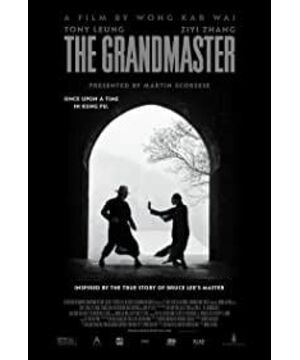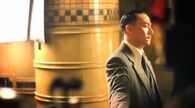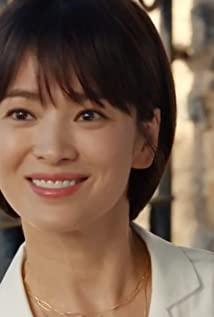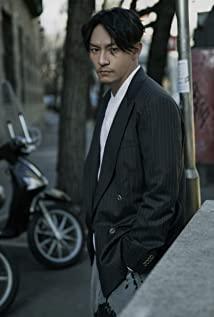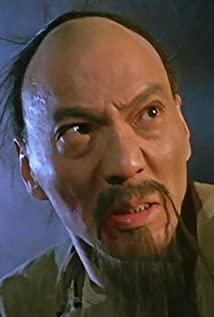Three cups of wine for a thousand feet of red dust, a pot of tea for the great cause of Qianqiu.
Text / Yu Ming
Kungfu, horizontal and vertical, fall, rise, go forward, succeed.
Times, together for a while, retreat, reunite, counterattack, leap forward.
The story of "The Grand Master" started in Foshan, fought decisively in the northeast, and left Hong Kong.
The people in the story have promoted the confluence of the North and the South, experienced sectarian battles, and endured the eight-year war of resistance.
The things in the story are the enmity of the rivers and lakes in the big era, and the feelings of the children in the small era.
It is Zou Jingzhi's rafters, the men and women who are trapped in the fight between beasts, the kung fu of Wang Jiawei's lyrical aesthetics, the martial arts that gradually disappeared in Xu Haofeng's documentary literature, and a journey to see himself, the world, and all beings.
♠ Injury·Love
Every time I watch this film, I always feel overwhelmed and disappointed. There are too many passages worth reminiscing: fighting in the rainy night, mourning in the snowy plains, the hero meeting in the gentle township, the lover in the dusty land, even a look, two lines of clear tears, a bean lamp, a few cold plums, are also incredibly beautiful, not to mention how many more There are fight scenes that challenge textbooks, and there are a lot of lines.
The female master Gong Er, a woman who will not let her men, rely on her ever-changing 64-handed superb martial arts that never fail, a perseverance to avenge her father's revenge rather than ruin her life, a love path steeped in grief and sighs, skills. Overwhelming the crowd and overwhelming the crowd, becoming the most dazzling character in the story.
And his wife, Zhang Yongcheng, is no longer the shrew who stood on the opposite side of Shang Wu in the story of Ye Weixin, but was as quiet and elegant as a water lily, as beautiful as a bamboo, with a delicate and embossed beauty in the dim yellow oil lamp, and a tearful face in the pouring rain. His face was full of warnings that he wanted to say goodbye.
Miss Gong Er and Zhang Yongcheng, two important women in Ye Wen's life:
One is as white as the snow in the mountains, and the other is as bright as the moon in the clouds;
A plain book, two or three lines, a beautiful woman's tears, heartbreaking;
One is easy to break just after passing, but the strong will be humiliated, and the other will be hurt by the wisdom, and the love will not last.
This kind of dilemma can be reduced to a stereotypical relationship between red roses and white roses if you are not careful, but the screenwriter has found a delicate balance between the two extremes of affection.
It is difficult to define the love between Ye Wen and Gong Er, not Mei Lanfang and Meng Xiaodong, nor Zhou Muyun and Su Lizhen.
It is difficult to see through what Ye Wen is thinking, and he cannot guess what he is in love with. He has a deep attitude towards his wife, friends, and even kung fu, but he is also ambiguous.
He is just a floating duckweed in the ups and downs of the times, and the waves play a developing Wing Chun master and a vague Ip Man.
Three cups of wine for a thousand feet of red dust, a pot of tea for the great cause of Qianqiu. Fill it up, raise a glass, drink it up, and life is over.
♠ Sigh · Wu
Wing Chun is fast and close, combining strength and softness, attacking and defending at the same time, spread out, and three axes are enough to defeat the enemy. This is Ye Wen.
Bajiquan is just violent and violent, grasping every inch by inch, punching hard and opening it hard, earning the reputation of "Wen has Taiji to secure the world, and martial arts has Baji to set the world". It's a line day.
Baguazhang is released immediately when it is retracted, returned immediately when it is gone, and when it is moved, the palm is turned and changed. This is Gong Er.
Xingyiquan is hard-hitting, powerful, and unpretentious. This is the white monkey horse three.
Wong Kar-wai traveled all over China, visiting hundreds of martial arts masters, just to explore the origins, and strive to make every martial arts movement precise and beautiful. The martial arts in the film are really endearing, with body shape and spirit, sweeping away the pompous style of action films in recent years. This one-dimensional move is very different from some characters' "martial arts of individual actions and kung fu of life actions".
"Martialization of individual actions", as strange as Lin Qingxia's version of Dongfang Invincible, "waves to break stones", "flying needles", "talking and laughing to kill", waving, sewing, talking and laughing and other daily actions hide murderous intentions.
And "Kung Fu of life actions" is as solid as Liu Jiahui, who built a tent and realized "Clavicle Capture" ("Master of Shaolin Erection"), simple as Yuan Biao, and learned "clothing and grabbing" ("The Brave" fear").
The action scenes of traditional martial arts films can be divided into 10 common types: "pan-intestinal battle, bamboo forest battle, flying over the eaves and walls, lingbo micro-steps, sword and light fighting methods, inn battles, lion dance battles, arena competitions, heroes' righteousness, and two-heroes duel". .
And the Republic of China's one move, one mood, one scene, no personalized action spectacle, but it is close to what real people do. There are several wonderful fighting scenes in the film, such as Ye Wen Yuye's one-on-ten battle, defeating the military killer in the first-line rain, Gong Er and Masan Railway Station's desperate duel, and the "Ten steps to kill a person, without skill but close to the demon," A thousand miles without leaving," but retains the knight-errant demeanor of "fuck the clothes away when things are done, and hide deeply and name well".
No matter how high the martial arts are, it is not as high as the sky, and the aptitude is too thick, but the most important thing is the attitude and bearing.
♠ Cherish · Say
The premiere version is more than delicate, but lacks in detail. It is true that Wong Kar-wai had no choice but to curb procrastination due to the jokes about the disappearance of a generation and the pressure of the producer, but how could someone who is known for his slow work and meticulousness make such a rush?
The soundtrack is rough and unrecognizable, but it is often inserted for unknown reasons, and the pinch is inexplicable. It doesn’t hurt to lower the bottom line. The biggest flaw is the editing confusion. Western thinking is confused.
The style of the first half is regular and the narrative is orderly, but the second half is transformed as if you have traveled to another play, not to mention that the important decade from 1940 to 1950 passed by with subtitles, and how did Ding Lianshan, the ghost of Guandong played by Zhao Benshan, interact with each other. Ye Wen got together, Shan Lun Zhang Zhen, the master of Bajiquan, who was domineering, but he was separated from the story. You must know that even Sanjiangshui (played by Xiaoshenyang), who was beaten up, had a chance to report to his family. The title of "One Line Sky" can only be conveyed to the audience through subtitles.
The only protagonist in the film who has a rivalry with Yisiantian is Gong Er, but that thrilling encounter did not contribute to the plot in the slightest. As for the cause and effect of the killing in Yisiantian's rainy night, why did he go to Hong Kong? There is nothing in this edited version. Explanation and suggestion. It is said that the director originally planned to revolve around the two lines of Ye Wen and Yixiantian, and cut them out for 4 hours. Due to the limited space, Yixiantian was cut off. Then, he felt that Gong Er's play was very brilliant, and cut a large part of Ye Wen.
Wong Kar-wai said that when Gong Er learned boxing with his father when he was a child, and Ip Man fought with Yi Tian, the scenes were cut so badly. Alas, Ye Wen's confrontation with Tian Xiantian, Liang Chaowei's confrontation with Zhang Zhen, this kind of interaction between the gods and the gods, which is comparable to the scene of Ximen Chuixue vs Ye Gucheng in the version of the Forbidden City of the Republic of China, has been cut off, Director Wang, you are distressed , the fans are heartbroken.
The heat has not yet arrived, and it is difficult to adjust.
♠ Music Corner
Different from the burden-shaking of the northern crosstalk sketches, several laughs come from the cold humor when the group photo was frozen. One is Xu Jinjiang who entered the group photo of the Jinlou Retirement Ceremony, and the other is the male idol of the White Rose Barber Hospital headed by Zhang Zhen. The group's fashionable style, the third is the cute Bruce Lee in the Wing Chun family.
Before Ye Wen went to battle with the gossip master, cousin Jinlou was lined up in a line, without a single line, showing thousands of charms. (I know the heroes and heroes from all over the world, and the aunts have good welfare)
Foshan's martial arts seniors are recruited and sent for expeditions. They go back and forth to the wheel and fight in close quarters. They often see danger in peace and strangeness in peace. They go back and forth with their words, teasing, and hidden intelligence. That is the smart and shrewd appearance of Nanyue people. It is a Hong Kong movie. The aesthetic of "poor skin and cheap looks" (in the words of Xu Haofeng's "Knife and Stars") is a long-lost Hong Kong-style martial arts taste.
When Uncle Benshan appeared on the stage, his face was serious and serious, but his eyebrows, eyes, tone and public impression were too happy, which became the condiment in this somewhat depressing and somewhat sad story. Xiaoshenyang's short-term soy sauce was a process that turned from sadness to joy. The camera jumped, and it was fixed on his crying slag face, and then he was beaten to tears by the fierce Bajiquan of the pure men, and finally got what he wanted. Became a member of the army of pure lords' male pets, and cringed in front of the camera with a smile on his face. Some people say that the master and the apprentice are too entertaining, but everyone on the stage is Tony Leung, how boring it would be.
Unlike Hitchcock, Quentin, and others who like to play a surprising role in his films, Wong Kar-wai is a person who is not good at or disdains to create surprises, but this time he invited a group of friends to act cute. The famous actor Zhang Zhilin, Xu Jinjiang, who came out halfway, and Yuan Heping, the martial arts instructor, made a cameo appearance as a Foshan martial artist. When Jin Shijie's highly recognizable voice sounded (at that time, he had not yet appeared in movies on both sides of the Taiwan Strait and three places), he couldn't help but be moved, that Jiang Binliu who said "old and beautiful"...
At the end, Master Ye, who is in suits and shoes, and Zhou Muyun, who writes martial arts novels, are combined into one. Sunglasses are also considered narcissistic. He did not forget to tease the boring Mood for Love and 2046 when he was in the martial arts.
♠ Lucky Nuo
Shooting Wing Chun, Ip Man, three years earlier than "The Grandmaster", "Ip Man" preemptively occupied a favorable terrain, making Ye Weixin popular, and Donnie Yen purple, followed by sequels and prequels like bamboo shoots after a rain, a wave of bombardment bombarded The audience was overwhelmed.
But what was the man in sunglasses who first signed up for Ip Man's script? After 5 years of pregnancy pain, it was difficult to give birth to "2046", and "Blueberry Night" was hatched after a little Hollywood spoiler. In the middle of repairing "Dong Xie Xi Po", he took revenge. Sitting motionless. It was not until Tony Leung finished filming "Red Cliff" that he acted like a spoiled child and said that if we don't go crazy, we will be old (original words: if we don't shoot, we won't be able to shoot anymore), and King Moji slowly regrouped and recruited horses.
After ten years of sharpening a sword, Frostblade has never tried it.
The blind man said: "When the peach blossoms bloom, there is a season, but no one knows when the film will be released."
No. 223 said: "I don't know when it started, all movies have been postponed, and I began to doubt that there are any movies in the world that cannot be postponed."
Xi Du said: "Every director will insist on his own postponement. Others think it is a waste of time, but he thinks it is very important."
The woman with sunglasses said: "Actually, the schedule does not mean anything. People will change. Today he can set 2013, and tomorrow he can set 2046."
Zhou Muyun said, "If you have one more movie ticket, will you go to see it with me?"
Li Yaohui said: "I finally saw "The Grandmaster" and felt very sad, because I always felt that there should be two people sitting in front of the screen."
But in any case, Wong Kar Wai finally fulfilled his promise.
Regardless of joy or sorrow, honor or disgrace, regardless of gain or loss, once a contract is made, it will be hard to stop it.
View more about The Grandmaster reviews


